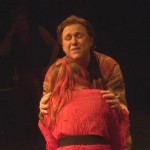Ceremony structures human life every day: from rituals of greeting or parting, eating, drinking, through to those which mark the stages of life for individuals and the community, and civic ceremonies that constitute collective national and religious identities. Shakespeare’s Henry V pertinently raises questions about their value, asking ‘O Ceremony show me but thy worth!’ (2.1.222-6). Since all ceremonies are costly in terms of time, effort and (for larger ceremonies) material resources, what was their value in early modern society? What affective power do they continue to hold today? And what happens when they are represented on stage?
We have explored these events in a series of interdisciplinary seminars using theoretical models developed in social anthropology, and through practical work. (see past events).
Capturing Witches
Rituals and ceremonies associated with witchcraft were considered in the ‘Capturing Witches’ conference of 2012 to commemorate the 400th anniversary of the first Pendle Witch trial in Lancaster in 1612. Read more on the Centre for Transcultural Writing website.
The conference included a rehearsed reading of Thomas Heywood and Richard Brome’s play The Late Lancashire Witches (1634) in Lancaster Castle. Papers from the conference are published in a special issue of the journalPapers from the conference are published in a special issue of the journal Preternature.
Ceremony, Ritual and War 
In July 2013 a work-in-progress production of Lady Jane Lumley’s 1550s translation of Iphigenia at Aulis, by Euripides was presented by The Rose Company at Reading University’s Early Modern Conference.
Its representation of sacrifice, ritual and gender will be pursued at the ‘Medieval & Early Modern Cultures of War and Peace: Women and War’ conference at Homerton College, University of Cambridge (23rd November 2014) and at University College London (24th November 2014)
Ceremony in Macbeth
In November 2012 Findlay led a workshop with the actors Andrew Jarvis (Royal Shakespeare Company, English Shakespeare Company) and James Evans (Bell Shakespeare Company) at the Australian and New Zealand Shakespeare Association’s conference ‘Shakespeare and the Emotions’. A paper on ‘Tragedy and the State of Ceremony: Macbeth’ at the Department’s symposium with Simon Critchley (July 2013) and a plenary lecture at Aarhus University (May 2014) continue this work.
Rites and Revivals at Penshurst Place
Lady Mary Wroth’s play Love’s Victory (c.1614-19) will be staged on 8 June 2014 at Penshurst Place, Kent (the site where it was composed). The Globe Theatre’s ‘Read not Dead’ will be accompanied by an academic conference. Details to follow.
